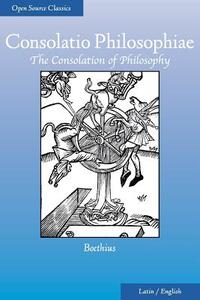You need to sign in or sign up before continuing.
Take a photo of a barcode or cover
medium-paced
informative
inspiring
mysterious
reflective
slow-paced
This is more of a 3.5 than just a 3.
This was a very insightful book about how people of this time period worked through their thinking processes as well as how they dealt with the concepts of God.
While reading this in tandem with Dante's Inferno, I was able to understand Inferno a lot more than if I had read it on its own.
Boethius explains many difficult concepts relatively clearly. (These concepts were made even more clear by my professor of Italian 150 [The Divine Comedy] rooting the concepts in examples from today)
Many of the concepts are repeated often, so they are driven home, but this also means that they get a bit boring. I found myself wanting to skim more as the book went along because it was saying the same thing for what seemed the millionth time.
I enjoyed how each Prose section has a brief blurb about the main concepts it was going to talk about. This made it easier to prepare myself for the upcoming reading.
The characters, Boethius and Lady Philosophy, felt a little too preachy for me at times, but they were talking about religion, so I guess it worked.
Overall, it was very insightful and interesting to read.
This was a very insightful book about how people of this time period worked through their thinking processes as well as how they dealt with the concepts of God.
While reading this in tandem with Dante's Inferno, I was able to understand Inferno a lot more than if I had read it on its own.
Boethius explains many difficult concepts relatively clearly. (These concepts were made even more clear by my professor of Italian 150 [The Divine Comedy] rooting the concepts in examples from today)
Many of the concepts are repeated often, so they are driven home, but this also means that they get a bit boring. I found myself wanting to skim more as the book went along because it was saying the same thing for what seemed the millionth time.
I enjoyed how each Prose section has a brief blurb about the main concepts it was going to talk about. This made it easier to prepare myself for the upcoming reading.
The characters, Boethius and Lady Philosophy, felt a little too preachy for me at times, but they were talking about religion, so I guess it worked.
Overall, it was very insightful and interesting to read.
challenging
hopeful
inspiring
reflective
slow-paced
El libro iba muy bien hasta que metió a Dios en la ecuación.
The Consolation of Philosophy turned out to be brilliant. I highly recommend it! It’s very short, but very dense. I think I fully digested maybe one-half of what was actually contained in the book. I thoroughly enjoyed Boethius’ devastatingly logical approach to the huge questions in life. It reminded me of something, and at first I couldn’t put my finger on it. I finally figured out that it was very reminiscent of C.S. Lewis’ theological writings. It has that same inexorable logic and the same exquisite arguments. Then I felt pretty dumb, because 5 minutes of Googling revealed that C.S. Lewis was VERY well-acquainted with Boethius, and everyone knew this except me. In 1962, Lewis wrote a list of ten books that influenced him most. Consolation of Philosophy was number 7. He wrote essays on it and was quite the fanboy. I will be the first to admit that Lewis’ reading tastes can be terribly, intimidatingly dry (and that’s coming from someone who enjoys medieval lit), but trust me, Consolation is worth a look.
funny
informative
reflective
medium-paced
And Boethius will never torture me again with his very, very questionable theology, ego, and incredible lack of grace and empathy. The end.
I read this for a class, it just wasn’t really my cup of tea.



